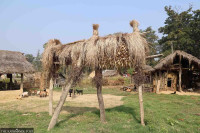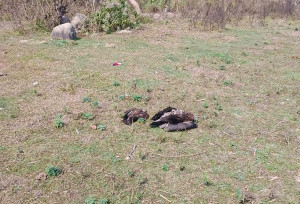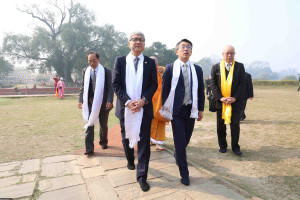Lumbini Province
Lack of necessary laws leaves local government helpless
With no laws in place, the local government in Province 5 is failing to work effectively in various sectors—particularly forest and land management.Amrita Anmol
Owing to the spirit of federalism adopted by the country, with the promulgation of the new constitution in 2015, people expected local governments would function more efficiently. However, the local government—across all provinces—hasn’t been able to deliver on its promises, mainly due to a lack of laws.
The constitution has delegated 22 different powers and authorities to the local unit to execute works regarding health, education, agriculture, livestock, social security, development activities, among others. But as various provincial laws are yet to be formulated, the local government has failed to work effectively in various sectors—particularly forest and land management.
Butwal, as the headquarters of Province 5, grows by the year with people rapidly migrating into the city—so much so that the market places and the settlement areas have expanded into public land. As per a report prepared by the Butwal Sub-metropolis last year, 16,193 houses have been constructed on public land. The laws of the country do not allow private property to be built on public land and the guilty should be rightfully evicted off the land.
However, the Province 5 government is yet to enact the necessary law/s into the matter so far. This absence of law has rendered the local unit incapable of taking action against the encroachers, says Shibaraj Subedi, the mayor of Butwal.
“There are innumerable problems at the local level. But we are helpless due to the lack of laws. Only the provincial laws can facilitate us to address such problems. But the province has not formulated the required laws,” he said. According to the Local Government Act 2074 BS, the local unit has authority to manage/evict people who have been staying on the public land in the local body. In a bid to manage rampant encroachment in Butwal, the sub-metropolis collected data of illegal settlers and formed a task force to conserve public land. “But we could not move forward. We could not remove the settlers from the public land since we weren’t equipped to do so without proper laws in place,” said Subedi.
Nearly 50 percent of the settlement areas in Devdaha, another municipality of Rupandehi district, is located in a forest area. Major settlements—including Khairahani and Bhawanipur—lie in forests. Charange, a dense settlement, is built entirely on forest land. Most of the market places, mainly along the East-West Highway of Sainamaina municipality lie in the forest area. The local government could neither evict the encroachers nor collect tax from them.
“It is the provincial government’s responsibility to formulate acts and policies to conserve the forest. But the province hasn’t done anything about it. We have to bear the brunt of the provincial government’s inefficiency and their inability to have necessary legal provisions in place,” said Chitra Bahadur Karki, the mayor of Sainamaina. The municipality is unable to check rampant encroachment and irregularities in the forest due to the provincial government’s failure to enact laws, he added.
Some local units attempted to formulate rules and regulations, but they were not effective enough, said Keshavnanda Baniya, chief of Marchawari Rural Municipality.
“We tried implementing some rules and regulations but it didn’t work. Our rules don’t hold the same power as laws do. The federal and provincial governments are not coordinating in regards to laws and policies for the local units—that’s where all the problems arise,” he said.
“The local units are unable to execute their works effectively as the federal and provincial governments haven’t formulated various laws. The laws formulated by the local government will be scrapped by default if they contradict with the federal and provincial laws. So the roles of the local government has become meaningless,” said Mahendra Prasad Pandey, an advocate who has expertise on local governance.




 14.24°C Kathmandu
14.24°C Kathmandu















